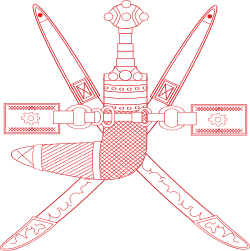Judicial system
The court system in Oman is regulated by Royal Decree 90/99. There are three court levels in Oman, the Elementary Court is the lowest court, followed by the Court of Appeal, and then the Supreme Court as the highest court in the country.
In addition to this there is an Administrative Court that looks into cases made against the government.
Administrative divisions
Administratively, the populated regions are divided into 11 regions (Governorates), presided over by governors appointed by the Sultan and therefore represent the Government in administering the region and head the local Municipal Council which include the heads of regional administrative departments as well as elected members from the public. Each Governorate is sub-divided into townships (Wilayats) and each Wilayat is presided over by a Wali who reports to the Governor and their responsibilities include maintaining public order within the geographical boundaries of the wilaya, working to resolve tribal disputes and conflicts, organizing and supervising the electoral process for members of the Shura Council and municipal councils as well as chairing local and developmental committees in the wilaya. The Governors of Muscat, Dhofar and Musandam are an important government figures, holding cabinet rank, while other Governors operate under the guidance of the Ministry of Interior. [2]
The Shura Council
In November 1991, Sultan Qaboos replaced the 10-year-old State Consultative Council with the Consultative Assembly (Majlis al-Shura) to systematize and broaden public participation in government. The Assembly has 94 elected members and exercises some legislative powers. The Shura Council consists of elected members representing all the wilayas of the Sultanate. The members are determined so that each wilaya is represented by one member if its population does not exceed thirty thousand at the time of the opening of nominations, and by two members if the population exceeds this limit at the same time. [3]
The election of the Shura Council members is conducted through general, secret, and direct voting as specified by the election law. A higher committee, which is independent and impartial and chaired by one of the Deputy Chief Justices of the Supreme Court, oversees the elections and adjudicates electoral appeals.
The Consultative Assembly serves as a conduit of information between the people and the government ministries. It is empowered to review drafts of economic and social legislation prepared by service ministries, such as communications and housing, and provide recommendations. Service ministers also may be summoned before the Majlis to respond to representatives' questions. It has no authority in the areas of foreign affairs, defense and security.
The State Council (Majlis A’Dawla) was established after the issuance of the Royal Decree No. 86/97 on the establishment of Oman Council, which consists of the State Council (Majlis A’ Dawla )and A’Shura Council(Majlis A’Shura ) . It enjoys a legal personality and financial and administrative independence. It is composed of a number of members not exceeding the number of members of the Shura Council. The Members of the State Council are appointed by a royal decree. Amongst their responsibilities of the State Council are proposing draft laws, approval or amendment of the draft laws referred by A’Shura Council and submit them to His Majesty for promulgation. Review draft development plans and the Annual Budget of the State referred by A’Shura Council , make recommendations, and send them back to the Council of Ministers.
Political parties and elections
Oman does not allow political parties and only holds elections with expanding suffrage for the Shura Council and the local Municipal councils. The previously influential opposition movement, the Popular Front for the Liberation of Oman, is dormant today. The last elections were held on 2023.
International organization participation
Oman participates in ABEDA, AFESD, AL, AMF, ESCWA, FAO, G-77, GCC, IAEA, IBRD, ICAO, IDA, IDB, IFAD, IFC, IHO, ILO, IMF, IMO, Inmarsat, Intelsat, Interpol, IOC, ISO (correspondent), ITU, NAM, OIC, OPCW, United Nations, UNCTAD, UNESCO, UNIDO, UPU, WFTU, WHO, WIPO, WMO, WTrO.
This page is based on this
Wikipedia article Text is available under the
CC BY-SA 4.0 license; additional terms may apply.
Images, videos and audio are available under their respective licenses.
